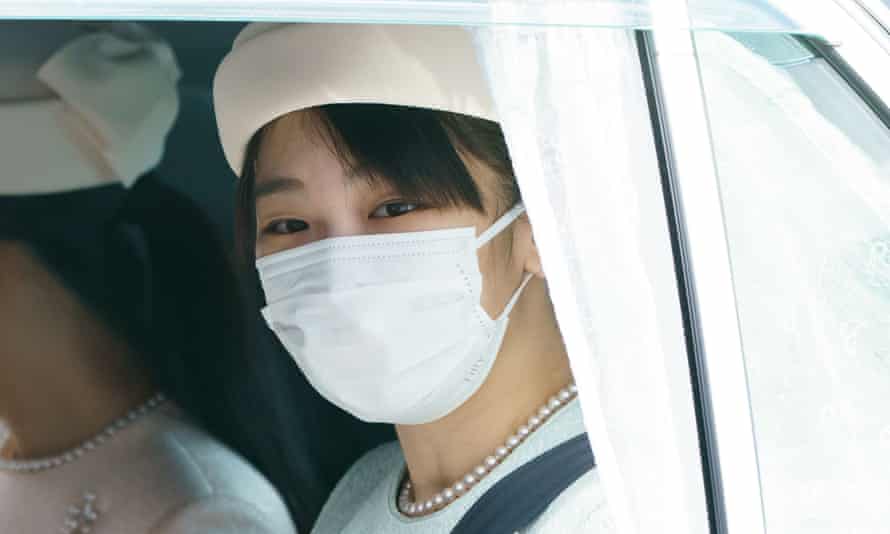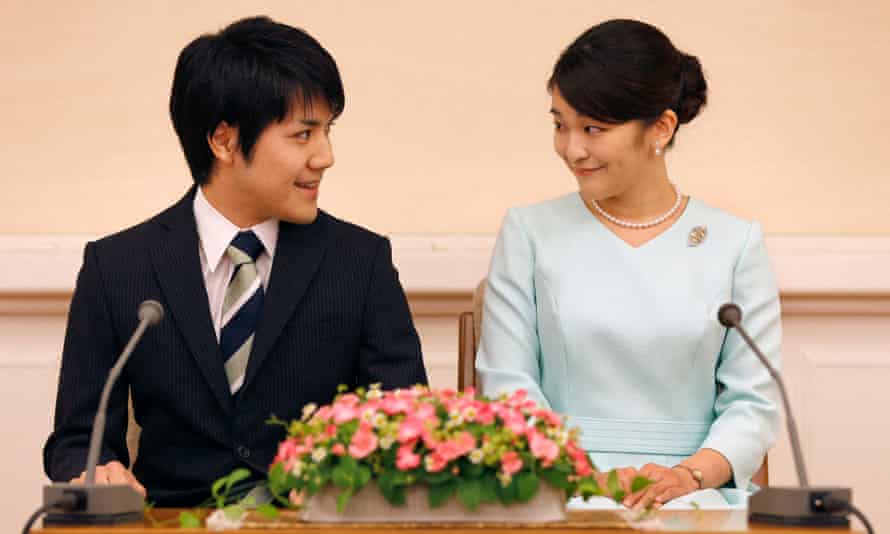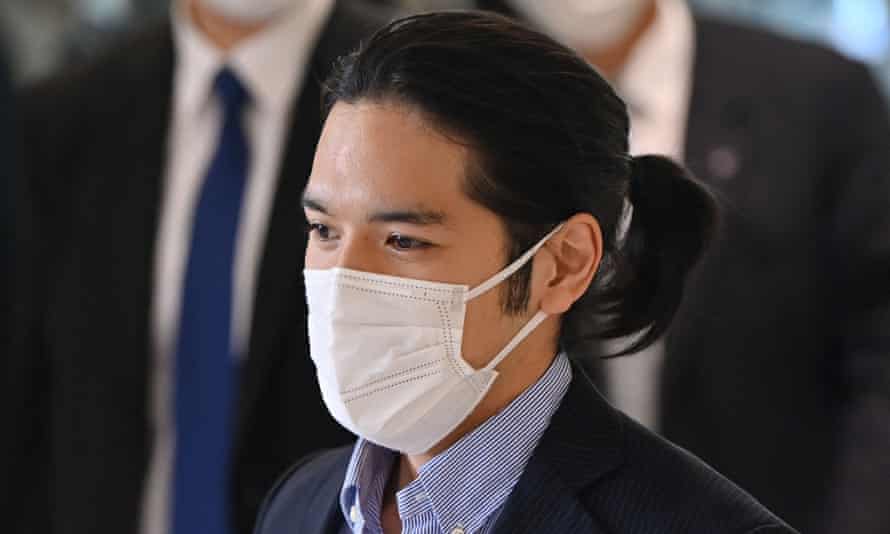Princess Mako wedding announcement stirs up media frenzy in Japan
Marriage with non-royal Kei Komuro to take place against backdrop of scandal, tabloid intrusion and public disapproval

When they announced their unofficial engagement four years ago, they were cast as a perfect match: the young princess and the clean-cut trainee lawyer, for whom she was prepared to sacrifice her imperial status.
Now the sound of wedding bells is within earshot, after the Imperial Household Agency announced on Friday that Princess Mako, the niece of Japan’s emperor, would marry her non-royal fiance, Kei Komuro, on 26 October.
But rather than bringing the country together in celebration, their nuptials will take place against a backdrop of scandal, tabloid intrusion and public disapproval of the kind usually associated with British royals.
Japan celebrated when, in May 2017, Mako and Komuro, contemporaries at the International Christian University in Tokyo, said they planned to get engaged later in the year and marry in November 2018.

But in February 2018, the household agency said the wedding had been put off for two years after reports that Komuro’s mother was embroiled in a financial dispute linked to ¥4m (£26,700) she had received from her former fiance, some of which was used to pay for her son’s education.
The revelation triggered a media feeding frenzy and waves of public opprobrium that will pursue the couple, who are both 29, all the way to their wedding day and beyond.
“Weekly magazines and daytime TV shows are reporting frantically on this because it helps their sales and viewing figures,” said Kaori Hayashi, a professor at Tokyo University who specialises in media and journalism studies, adding that the tabloid media had declared open season on Komuro and his mother. “They are particularly critical of the Komuros because they are not fully protected by imperial household agency.”
An attempt by Komuro to publicly explain the dispute – amid disagreement over whether the money was a gift or a loan – did not impress a skeptical public, while his offer to return the sum to his mother’s former fiance reportedly came to nothing.
Komuro, who recently returned to Japan with a law degree from Fordham University in New York, has become easy prey for the tabloids and conservative commentators.
Aside from triggering speculation about an impending announcement about the timing of their wedding, his arrival at Tokyo’s Narita airport, where he was greeted by more than 150 reporters, triggered sniffy tabloid and social media commentary over everything from his body language to his choice of coiffure, a ponytail he had grown during his time in the US.
Even the usually hands-off broadsheets have felt compelled to devote space to the scandal that refuses to lift from the couple’s relationship.
After confirming that they planned to start a new life in the US, the couple drew inevitable comparisons with Harry and Meghan, although the Japanese media’s treatment of Mako and Komuro pales beside the vitriol regularly heaped on the Sussexes by their British counterparts.
The scandal surrounding their relationship means this will be a royal wedding like no other. Mako, who, like other princesses who marry commoners will have to leave the imperial family, has said she will forgo a $1m (£742,000) payment traditionally given to women who give up their royal status.
The decision, unprecedented in the postwar period, is being seen as an attempt to ward off yet more public criticism, since the payment is funded by the taxpayer.

The wedding itself will be shorn of the ritual usually on display when a member of the imperial family ties the knot.
The couple will not have an official engagement ceremony and will forgo a formal meeting with Mako’s uncle, Emperor Naruhito, before the wedding. Instead, they will register their marriage at a government office before moving to New York, where Komuro has lined up a job with a leading law firm.
But the couple is expected to continue to attract media attention on the other side of the Pacific. Just before his recent visit to Japan, his first trip home for three years, Komuro was reportedly chased through the streets of New York by Japanese reporters.
Komuro and Mako, who can never be a reigning empress due to Japan’s male-only succession law, will leave behind a deeply divided Japanese public. In a poll by the Mainichi newspaper, 38% of respondents supported the marriage, while 35% opposed it and 26% expressed no interest. Aera, a weekly magazine, found that just 5% of respondents felt like celebrating the marriage, while 91% said they were in no mood to share in the couple’s joy.
“Even the most minuscule details – like his hair – have became fodder for daytime television,” said Akinori Takamori, an expert on the imperial family who is a lecturer at Kokugakuin University in Tokyo, and suggested that media scrutiny of Komuro’s family amounted to a human rights violation.
“It’s not desirable to have the people split over this matter when the imperial family should be a symbol of unity for the country.”
Mako’s parents have hardly been effusive in their support. Earlier this month her mother, Crown Princess Kiko, said she would respect her daughter’s feelings “as much as possible”, adding: “While there have been matters that I could empathise with, there were also areas where our opinions differed.”
Akishino, who is first in line to the throne, said last December that he “approved” of the marriage, “if marriage is what they truly want”.
… we have a small favour to ask. Tens of millions have placed their trust in the Guardian’s high-impact journalism since we started publishing 200 years ago, turning to us in moments of crisis, uncertainty, solidarity and hope. More than 1.5 million readers, from 180 countries, have recently taken the step to support us financially – keeping us open to all, and fiercely independent.
With no shareholders or billionaire owner, we can set our own agenda and provide trustworthy journalism that’s free from commercial and political influence, offering a counterweight to the spread of misinformation. When it’s never mattered more, we can investigate and challenge without fear or favour.
Unlike many others, Guardian journalism is available for everyone to read, regardless of what they can afford to pay. We do this because we believe in information equality. Greater numbers of people can keep track of global events, understand their impact on people and communities, and become inspired to take meaningful action.
We aim to offer readers a comprehensive, international perspective on critical events shaping our world – from the Black Lives Matter movement, to the new American administration, Brexit, and the world's slow emergence from a global pandemic. We are committed to upholding our reputation for urgent, powerful reporting on the climate emergency, and made the decision to reject advertising from fossil fuel companies, divest from the oil and gas industries, and set a course to achieve net zero emissions by 2030.
If there were ever a time to join us, it is now. Every contribution, however big or small, powers our journalism and sustains our future. Support the Guardian from as little as $1 – it only takes a minute. Thank you.

No comments:
Post a Comment